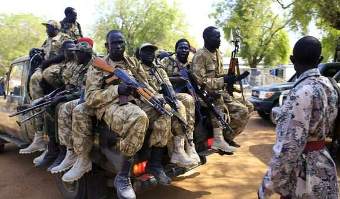South Sudan denies executing soldiers of Nuer ethnicity
October 15, 2014 (JUBA) – The South Sudanese government has vehemently denied reports alleging that some of its soldiers of Nuer ethnicity were separated and killed in cold blood in various places in Upper Nile state.

“This is unacceptable and cannot be allowed to continue like that,” he added.
Dau said the allegation were indicative of a strategy to spread propaganda and cause “unnecessary friction and suspicion in the army”.
“I want to say there is no truth is what is reported. It is just another strategy and propaganda by the rebels of Riek Machar,” he said.
“I am not aware of any SPLA (South Sudanese army) soldiers, let alone officers with the rank of brigadier general, killed in Paloich. Not even a single comrade has been sick in either Baliet or Anakdiar,” said Dau, who hails from the region where the alleged killings are said to have taken place.
Meanwhile, SPLA spokesperson Colonel Philip Aguer has denied any knowledge of the allegations.
Upper Nile state’s minister of information, Peter Hoth Tuach, described the claims as “a total lie”, stressing that the army remained a united front.
“Our army is united and strong than ever before, despite the unnecessary political division within the leadership [that] has caused rebellion,” he said on Wednesday.
South Sudan has been embroiled in conflict since a political dispute in the ruling party (SPLM) headed by president Salva Kiir turned violent in mid-December last year, triggering tribal tensions across the country.
The fighting has pitted the Dinka, South Sudan’s largest single ethnic group, of which Kiir hails, and their allies against the against pro-Machar rebel forces, mostly of Nuer origin, the second largest community in the country.
Human rights groups have documented atrocities and targeted ethnic killings on both sides.
In the latest alleged incident, the opposition movement claimed that an unspecified number of soldiers loyal to the government from the Nuer tribe were shot dead at Malakal’s main military barracks.
In a statement extended to Sudan Tribune on Wednesday, rebel spokesperson for military affairs Brigadier General Ruai Lul Koang said that more than 50 soldiers, including one senior officer, were also killed in separate attacks.
According to the statement, the senior officer was executed in Paloich, while 27 were killed at Anakdiar and 25 in the Baliet area.
Oil-rich Upper Nile has been a flashpoint for violence since the conflict erupted, changing hands several times between government and rebel forces.
Anakdiar and Bailiet are located east of the state capital, Malakal, while Paloich lies to the north.
Koang said reliable reports allege the victims were bound together before being summarily executed by their Dinka colleagues, after which their bodies were thrown into the Sobat River, which empties into the White Nile River at the mouth of Jonglei Canal.
“The floating corpses were spotted, collected and taken for proper burial by our gallant forces manning both banks of the river,” he said.
The alleged incident comes four days after rebels forces claimed to have inflicted heavy casualties on government troops after renewed clashes broke out round Dolieb Hills, Zinc and Acheb-Nil.
Koang said the alleged killings clearly showed the SPLA had lost its legitimacy.
“The execution of Nuers serving in Salva’s faltering regime sends a clear message to those under illusions that [the] SPLA was still a national army,” he said.
“These heinous crimes meted [out] on own comrades show [the] SPLA has become a tribal outfit,” he added.
The exact circumstances of the alleged killings and when they occurred remains unclear. The identities of the alleged victims have also not been revealed.
Government officials have suggested that the bodies purportedly found in the river could be those of rebel fighters killed during recent clashes in Achab-Nil and Doleib Hills, and for whatever reason were not given a proper burial.
There have also been claims that the bodies may have been deliberately dumped by rebel forces.
However, none of the allegations can be independently verified.
Machar, who was sacked from his post as vice-president last July, has accused his former boss of instigating the violence by suppressing political reforms and trying to disarm Nuer soldiers serving as presidential guards, which led to clashes breaking out in the capital, Juba.
He also accused Kiir of overseeing the massacre of over 20,000 innocent unarmed Nuer civilians during the initial phase of the violence.
President Kiir on the other hand accuses his former deputy of planning to stage a military coup to overthrow the government.
The two rival leaders continue to trade accusations over violations to an earlier ceasefire agreement signed in January and recommitted to in May.
The political crisis has plunged the country into its deadliest outbreak of violence in a decade.
Tens of thousands of people have died so far, while more than 1.5 million have been displaced, with aid agencies warning the country is on the brink of famine.
Negotiations in Ethiopia between the two rival factions remain on shaky ground, with ongoing peace talks hampered by repeated delays and disagreement over the terms of a political settlement.
(ST)
